In the fast-paced Healthcare Digital Marketing, every industry has been compelled to embrace technology and the healthcare sector is no exception. In India, where healthcare services are evolving rapidly, the role of digital marketing and website development has become pivotal in reaching and serving patients effectively. In this article, we will delve into the significance of healthcare digital marketing and website development, exploring how they are transforming the healthcare landscape in India.
The Digital Transformation of Healthcare
The healthcare industry in India has witnessed a significant transformation in recent years, driven by advancements in technology. With the increasing penetration of smartphones and internet connectivity, people are now more inclined to seek medical information online before making healthcare decisions. This shift in consumer behavior has given rise to the need for a robust digital presence for healthcare providers.
The Power of Healthcare Digital Marketing
Digital marketing in the healthcare sector involves the strategic use of online platforms to connect with patients, share information, and promote healthcare services. This approach allows healthcare providers to engage with a wider audience and build a strong online reputation. Here are some key aspects of healthcare
Digital Marketing
Social Media Engagement Social media platforms like Facebook, Instagram, and Twitter provide an avenue for healthcare providers to share informative content, patient testimonials, and updates about medical advancements. This engagement helps in establishing a rapport with patients and creating a sense of trust.
Search Engine Optimization (SEO)
Ranking high on search engine results pages is crucial for healthcare providers. Patients often turn to search engines like Google to find healthcare services. Implementing effective SEO strategies ensures that providers’ websites appear prominently in relevant searches.
Content Marketing
Sharing valuable and relevant content through blogs, articles, and videos not only educates patients but also positions healthcare providers as authoritative sources in their respective fields.
Online Advertising
Paid online advertising through platforms like Google Ads and social media allows healthcare providers to target specific demographics, increasing the chances of reaching potential patients.
Empowering Healthcare through Website Development
A well-designed and user-friendly website is the cornerstone of any successful Healthcare Digital Marketing strategy. For healthcare providers, a website serves as an online storefront where patients can learn about services, schedule appointments, and access important information. Here’s why website development is crucial:
First Impression: A website is often the first point of contact between patients and healthcare providers. A professionally designed website creates a positive first impression and instills confidence in potential patients.
Accessibility: A user-friendly website ensures that patients can easily navigate through services, find contact information, and even access patient portals for medical records.
Appointment Scheduling: Integrating appointment scheduling features into the website streamlines the process for patients. This convenience can lead to increased patient engagement.
Information Hub: Healthcare websites can serve as a hub for medical resources, patient education materials, and blog posts that address common health concerns.
The Future of Healthcare Digital Marketing and Website Development
As technology continues to advance, the healthcare industry’s reliance on digital marketing and website development is expected to intensify. Personalized experiences, telemedicine integration, and interactive patient engagement are some trends that will likely shape the future of healthcare’s digital landscape in India.
In conclusion, the role of digital marketing and website development in India’s healthcare sector cannot be overstated. These tools not only enable healthcare providers to connect with patients but also empower patients to make informed decisions about their health. By embracing these technologies, the healthcare industry is taking a significant step toward a more patient-centric and accessible future.

